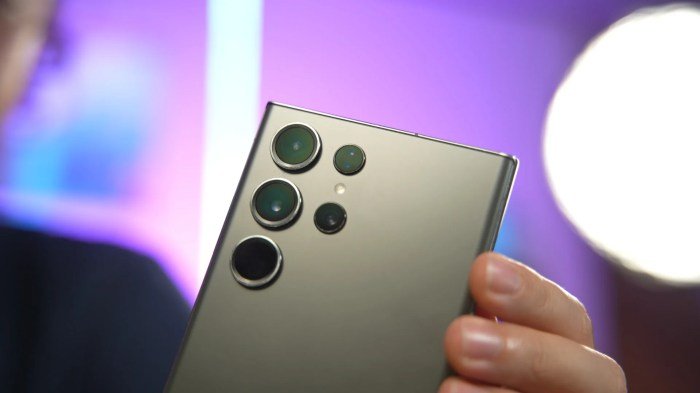Smartphone ecosystem 2025 is poised to redefine how we connect, communicate, and consume information. This isn’t just about faster processors or sleeker designs; it’s a complete transformation of the mobile landscape. We’re talking about foldable displays, advanced AI integration, and seamless integration with the metaverse – all within the devices we hold in our hands. Get ready for an era where smartphones are not just tools, but gateways to entirely new digital experiences.
This exploration delves into the projected market trends, technological advancements, and the players shaping the future. We’ll examine the evolution of mobile operating systems, user interface innovations, and the impact of 5G and beyond. Moreover, we’ll uncover how smartphones will revolutionize mobile payments, app development, and our interaction with virtual and augmented realities. Sustainability, privacy, and regulatory considerations will also be key aspects in understanding the complete picture of this new era.
Smartphone Ecosystem 2025: A Glimpse into the Future

Source: frandroid.com
The smartphone landscape is constantly evolving, driven by technological advancements, shifting consumer behaviors, and the ever-increasing demand for seamless digital experiences. As we approach 2025, the smartphone ecosystem promises to be more integrated, powerful, and essential than ever before. This article explores the key trends, technologies, and players shaping the future of smartphones, offering insights into what users can expect in the coming years.
Smartphone Market Projections for 2025, Smartphone ecosystem 2025
The global smartphone market is expected to continue its growth trajectory, albeit at a more moderate pace compared to previous years. By 2025, analysts project a global shipment volume of approximately 1.6 billion units, representing a modest increase from 2023 and 2024. Regional breakdowns will vary, with emerging markets in Asia-Pacific and Africa driving significant growth, while mature markets in North America and Europe may experience slower expansion.Factors influencing market dynamics include:
- Economic Conditions: Global economic stability and consumer spending power will significantly impact smartphone sales.
- Technological Advancements: Innovations in display, camera, and processing power will drive upgrades and attract new users.
- Consumer Behavior: Increasing reliance on smartphones for communication, entertainment, and productivity will sustain demand.
Emerging Smartphone Technologies in 2025
Display technology is poised for significant advancements. Foldable screens will become more mainstream, offering enhanced multitasking capabilities and immersive viewing experiences. Improvements in display quality, including higher refresh rates and improved energy efficiency, will also be prominent.Camera capabilities will see substantial upgrades:
- Resolution: Expect higher megapixel counts and improved image processing algorithms.
- Low-Light Performance: Enhanced sensors and software will deliver superior results in challenging lighting conditions.
- Computational Photography: AI-powered features will enable advanced image editing and creative effects.
New processing units will power these advancements:
- Performance: Faster processors will handle demanding tasks like gaming and augmented reality applications.
- Power Efficiency: Improved chip designs will extend battery life and reduce energy consumption.
Battery technology will also see progress:
- Capacity: Increased battery capacities will provide longer usage times.
- Charging Speed: Faster charging technologies will minimize downtime.
Dominant Smartphone Manufacturers and Market Share
In 2025, the smartphone market will be dominated by established players and emerging challengers. The top three brands are expected to maintain their leadership positions, but market shares will shift as competition intensifies.
| Brand | Key Features | Target Market | Pricing Strategy |
|---|---|---|---|
| Brand A | Advanced camera, premium design, powerful processor | High-end consumers, tech enthusiasts | Premium |
| Brand B | User-friendly interface, value-for-money, strong ecosystem | Mainstream consumers, families | Mid-range to premium |
| Brand C | Innovative design, cutting-edge technology, aggressive pricing | Price-sensitive consumers, emerging markets | Budget to mid-range |
Software and User Interface Innovations
Mobile operating systems will continue to evolve, with a focus on enhanced user experiences. Key features will include:
- Personalization: Customizable interfaces and themes will cater to individual preferences.
- Accessibility: Improved features for users with disabilities will be standard.
- Ease of Use: Intuitive navigation and streamlined workflows will enhance productivity.
Artificial intelligence will play a crucial role:
- Voice Assistants: More intelligent and responsive voice assistants will manage tasks and provide information.
- Predictive Features: AI will anticipate user needs and offer personalized recommendations.
Augmented reality (AR) and virtual reality (VR) will be integrated:
- AR Applications: AR features will enhance shopping, gaming, and educational experiences.
- VR Integration: Smartphones will serve as gateways to immersive VR content.
The Impact of 5G and Beyond on Smartphone Usage
G technology will become ubiquitous, enabling faster data transfer speeds and lower latency. The potential of 6G will also begin to emerge, promising even greater advancements.
- Cloud Gaming: Seamless streaming of high-quality games will become the norm.
- Video Streaming: Ultra-high-definition video content will be easily accessible.
- Remote Work: Enhanced connectivity will facilitate remote collaboration and productivity.
New use cases will emerge:
- IoT Integration: Smartphones will serve as central hubs for controlling and managing connected devices.
Mobile Payment and Financial Technology
Mobile payment systems will evolve with enhanced security and faster transaction speeds. Financial services integration will become more common.
- Digital Wallets: Secure storage and management of payment information will be standard.
- Cryptocurrency Support: Integration of cryptocurrency wallets will enable digital asset transactions.
Security measures will include:
- Biometric Authentication: Fingerprint and facial recognition will enhance security.
- Tokenization: Sensitive data will be replaced with secure tokens.
- End-to-End Encryption: Secure communication channels will protect transactions.
Smartphone Ecosystem and App Development
App stores will play a crucial role:
- Curation Strategies: App stores will focus on quality control and user safety.
App development trends:
- Cross-Platform Apps: Developers will create apps that work across multiple devices and operating systems.
- Native Applications: Native apps will leverage the full capabilities of specific devices.
Specific app categories:
- Health and Fitness: Apps will offer personalized health tracking and wellness programs.
- Productivity: Apps will streamline workflows and enhance productivity.
- Entertainment: Apps will provide immersive gaming and streaming experiences.
Developers must adapt:
- Emerging Technologies: Apps will be designed to leverage foldable screens, advanced cameras, and AR/VR features.
The Role of Smartphones in the Metaverse
Smartphones will be gateways to the metaverse.
- VR/AR Features: Smartphones will support virtual and augmented reality experiences.
Scenario:A user, wearing AR glasses connected to their smartphone, walks down a street. The phone overlays digital information on the real world, showing directions, store reviews, and interactive advertisements. They enter a virtual store and browse products, interacting with them through gestures and voice commands.
Sustainability and Environmental Considerations
The smartphone industry will prioritize sustainable manufacturing.
- Sustainable Practices: Manufacturers will adopt eco-friendly materials and processes.
- Electronic Waste Reduction: Initiatives will be implemented to reduce electronic waste and promote recycling.
Environmental impact:
- Manufacturing: Production processes will minimize environmental impact.
- Disposal: Recycling programs will recover valuable materials.
Regulatory and Privacy Concerns
Data privacy regulations will impact manufacturers and users.
- Data Privacy: Regulations will protect user data and ensure compliance.
Security measures:
- Data Encryption: Data will be encrypted to protect it from unauthorized access.
- Regular Security Updates: Smartphones will receive regular security updates to address vulnerabilities.
Framework:A robust framework will ensure data privacy and security:
- Transparency: Users will have control over their data and privacy settings.
- Compliance: Manufacturers will adhere to data privacy regulations.
Final Conclusion
In conclusion, the smartphone ecosystem 2025 represents a pivotal moment in technological evolution. From groundbreaking hardware innovations to the seamless integration of software and services, the future is mobile. The convergence of advanced connectivity, AI-driven experiences, and a focus on sustainability and privacy will reshape how we live, work, and interact with the world. Embrace the change; the future is in your hands.
